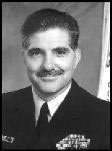On Puget Sound, as in Alaska, marine-protection and community advocates have long complained that the Coast Guard leadership is too cozy with, and indulgent of, oil and shipping interests. A parallel, perennial issue has arisen anew: the revolving door between the Coast Guard and the shipping industry, through which retiring Coast Guard commanders pass on their way to comfortable second careers representing the businesses they previously regulated.
On Sept. 1, the well-regarded Capt. Mike Moore, who last month retired from commanding marine safety and spill-prevention operations as the Coast Guard’s captain of the port in Seattle, will start his new job as executive director of the Puget Sound Steamship Operators Association. He’ll succeed Harry Hutchins, who before joining the Steamship Operators led the Coast Guard’s Northwest spill prevention and hazardous waste operations. And he’ll join a distinguished lineage that includes Richard Soffie, another retired Seattle port captain who went on to direct the industry-sponsored Marine Exchange, and who now is vice president for the Holland America cruise line. In Alaska, one retired Coastie manages the Alyeska oil-pipeline terminal; another, who now heads the American Shipping Council, was president of Exxon Shipping in 1990 when the Exxon Valdez fouled Alaska’s Prince William Sound.
Another flash point for the Coast Guard’s critics has been the years-long tussle over stationing a rescue tug on the unguarded waters of the outer Strait of Juan de Fuca, a measure that activists, the state, and local governments all support, but which the shipping industry and Coast Guard have opposed as a needless expense.
Last week the U.S. Senate Transportation Appropriations Subcommittee, chaired by Sen. Patty Murray, approved $1.6 million, about what the rescue tug would cost each year, for “enhanced oil spill prevention activities in Washington state.” But this money is allocated for measures “such as” a rescue tug, and the captain of the port may spend it however “he believes will best protect these waters.” And what Coast Guard officials have believed so far jibes handily with what the shippers think.
Might links to the shipping industry have anything to with that? U.S. Sen. Warren Magnuson, the definitive model of the bring-home-the-bacon powerbroker that Murray aspires to be, thought so. In 1975 he lamented the “limited success” of marine safety legislation, “because the power to regulate vessel operations and tanker construction standards has simply not been used by the Coast Guard as we in Congress expected.” Fighting to block the massive transshipment of Alaskan oil through Washington’s Cherry Point, Magnuson publicly complained that “the local head of the Coast Guard made a speech in favor of the Cherry Point site, then retired from the Coast Guard and went to work for the company promoting that site.”
Today, activist Fred Felleman of Ocean Advocates, decries “the Coast Guard’s revolving door” in similar terms: “They’re working for the shipping industry with their epaulets on. You’re never going to solve anything while this continues.”
Retired UW professor Ed Wenk monitored the Coast Guard as an aide in three presidential administrations, as a member of the commission investigating the Exxon Valdez spill, and as the author of a study of ferryboat safety. The revolving door is “an endemic disease” in the Coast Guard, Wenk says.
And it’s inevitable and understandable that retiring Coasties would go to work in shipping, as well as other maritime fields. As military officers, they earn relatively modest salaries but can retire after 20 years and have second careers. Their expertise lies in maritime administration; would it be fair to deny them a chance to use it? Or fair to the public? Harry Hutchins asks, “Is it not better to take advantage of all that experience that the taxpayers have paid for?”
Hutchins adds that his successor, ex-captain of the port Moore, “didn’t entertain any offers while he was in active command. The Puget Sound Steamship Operators didn’t talk to him till he was divested of his authority”—though he was still in the service. (Moore, on vacation, couldn’t be reached for comment.)
That’s much less than the one-year “cooling-off period” typically required of retired military officials before they can go to work for contractors they’d done business with. But no such rule applies to those performing regulation rather than contracting. Maybe it should, suggests University of Alaska professor Rick Steiner, a longtime state adviser on Prince William Sound protection: “Two years should be the minimum.” Steiner concedes that the Coast Guard attracts “some of the most dedicated professionals you’ll ever meet,” along with the usual opportunists. “But you do wonder what’s dangled in front of them while they’re regulating and what’s done to get them jobs when they’re done regulating.”









